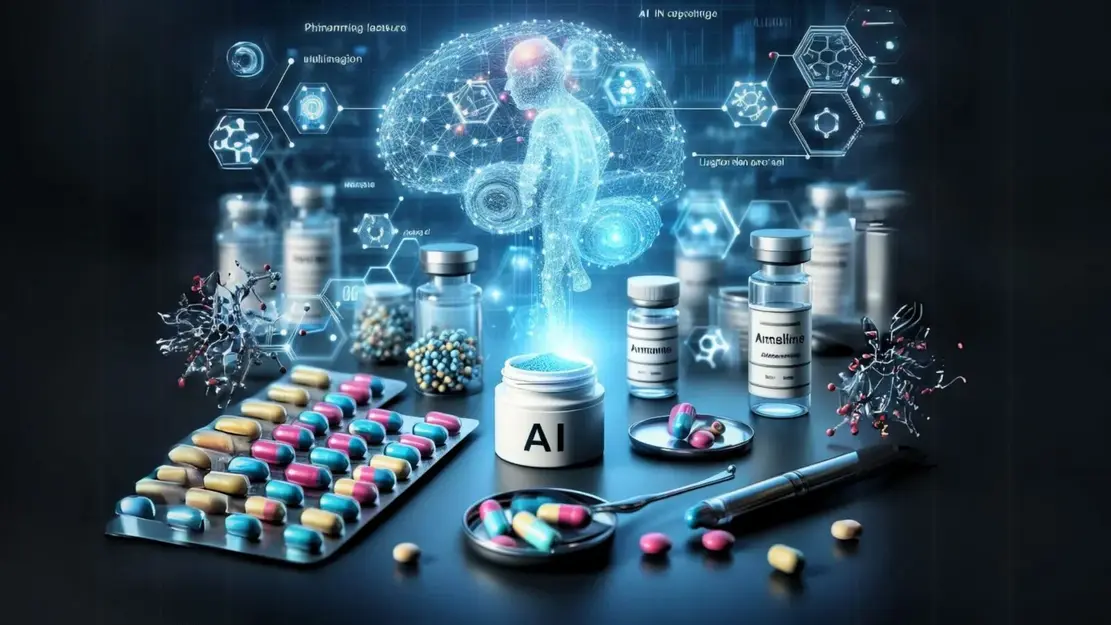
Discovering new drugs has always been one of the most challenging, time-consuming, and expensive aspects of medicine. In the past, developing a single new drug could take more than a decade and cost billions of dollars, with no guarantee of efficacy. But by 2025, artificial intelligence (AI) will change all that. It will make drug development faster, more efficient, and more precise than ever before. AI will accelerate research by years by analyzing massive datasets, predicting molecular interactions, and identifying potential drug candidates in record time.
This revolution not only saves time and money but also makes life-saving medicines more accessible to people around the world. From rare diseases to common, long-term conditions, AI is enabling advances that once seemed impossible. Through machine learning models, advanced simulation techniques, and integration with real patient data, AI is ushering in a new era of personalized, precise, and rapid drug development.
How AI Is Driving the Search for New Drugs:
From early-stage research to clinical trials, AI is an essential part of every step in the drug development process. Previously, scientists had to manually test thousands of compounds to identify a few promising candidates, a process that could take years. Today, AI programs can perform these tests virtually, analyze the structures of chemicals, and predict how they might interact with the human body.
This computing power helps scientists more accurately identify drug targets and create molecules that are more likely to work. AI is also being used to explore new applications for approved drugs, saving significant time and money. For example, AI is helping researchers quickly identify potential drugs to combat the COVID-19 pandemic. By 2025, AI will be an integral part of pharmaceutical companies, research institutions, and biotech firms. It significantly accelerates the development of new drugs.
AI and Molecular Modeling:
Molecular modeling is one of the most innovative approaches AI uses to discover new drugs. Previously, molecular testing was largely based on trial and error, observing how chemicals interact with proteins in the body. AI has revolutionized this by using deep learning models to guess the three-dimensional structures of proteins and test their interactions with potential drugs. Tools like AlphaFold have demonstrated their ability to predict protein folding with high accuracy.
This has opened up new possibilities for studying diseases at the molecular level. AI can now recommend chemical changes that make drugs safer, more effective, and more stable. This is particularly useful in combating diseases once considered “incurable,” such as certain types of cancer and neurological disorders. AI-driven modeling paves the way for the next generation of precision medicine, reducing uncertainty and providing more information about molecular behavior.
AI in Clinical Trials and Patient Data Analysis:
Clinical research is often the most expensive and time-consuming part of drug development. Many seemingly promising drugs ultimately fail due to unexpected side effects or ineffectiveness across a wide range of populations. AI is working to address these issues by analyzing real patient data, genetic data, and electronic health records, enabling more rational planning and smoother clinical trial processes. Predictive models can identify appropriate patient populations, simulate outcomes, and reduce the risk of errors.
For example, AI can help experts determine how a drug behaves differently in men and women or in people with certain genetic differences. This level of precision can reduce trial costs, accelerate approvals, and ensure safer and more effective treatments. By 2025, many pharmaceutical companies will be using virtual clinical trials conducted by AI. These trials allow researchers to test drugs in a virtual world before administering them to real patients. This new concept allows trials to be conducted faster, more thoroughly, and more patient-focused.
AI Enables the Future of Drug Development:
The future of artificial intelligence (AI) in drug development looks bright, with discoveries shaping medicine for the next decade. Algorithms will be able to process increasingly large datasets, integrate genomic and proteomic data, and provide the research community with real-time insights as they continually improve. Personalized medicine will also advance, as AI helps develop drugs tailored to each individual’s genetic makeup. Rare diseases often receive insufficient research funding because so few people suffer from them. But now, AI offers new hope, making drug development cheaper and faster.
Collaborations between AI startups, large pharmaceutical companies, and healthcare providers are also accelerating innovation. These collaborations are making drug development a more interconnected, data-driven process. While challenges remain, such as obtaining regulatory approval, ethical concerns, and protecting data privacy, the benefits far outweigh the risks. AI is no longer just a tool; it is quickly becoming a crucial component of modern drug development. It accelerates innovation and provides patients with life-saving treatments at an unprecedented pace.
Conclusion:
The use of AI in drug development is transforming medicine in unprecedented ways. AI accelerates the search for new treatments for patients by shortening research timelines, lowering costs, and increasing research accuracy. From early molecular modeling to patient-centered clinical trials, AI is making the entire drug development process more efficient. By 2025, AI will no longer be just an experiment but a vital component of pharmaceutical research. This evolution will not only lead to faster treatments for known diseases but also to treatments for previously intractable conditions. While challenges remain, the increasing integration of AI and human knowledge means that future drug development will become smarter, faster, and more patient-focused. In the coming years, AI will remain at the heart of medical progress, ensuring that life-saving medicines reach those who need them most.
FAQs:
1. How does AI accelerate the development of new drugs?
AI accelerates drug development by analyzing massive data sets, predicting molecular interactions, and identifying potential drug candidates faster than traditional methods.
2. Can AI independently develop new drugs?
AI can use deep learning and molecular modeling techniques to generate new drug molecules, but human experts remain crucial for drug testing and validation.
3. How is AI used in clinical trials?
In clinical trials, AI is used to select patient groups, predict potential outcomes, mitigate risks, and develop optimal study plans. This ensures that studies proceed faster and deliver better results.
4. Does using AI to identify new drugs save money?
Yes, AI reduces the costs of drug development by shortening timelines, reducing failed trials, and finding new uses for old drugs.
5. How does AI complicate the development of new drugs?
Data privacy, obtaining regulatory approval, ethical considerations, and ensuring fairness and transparency in AI algorithms are important considerations.


